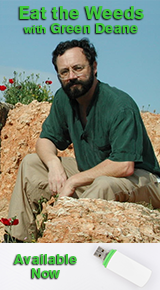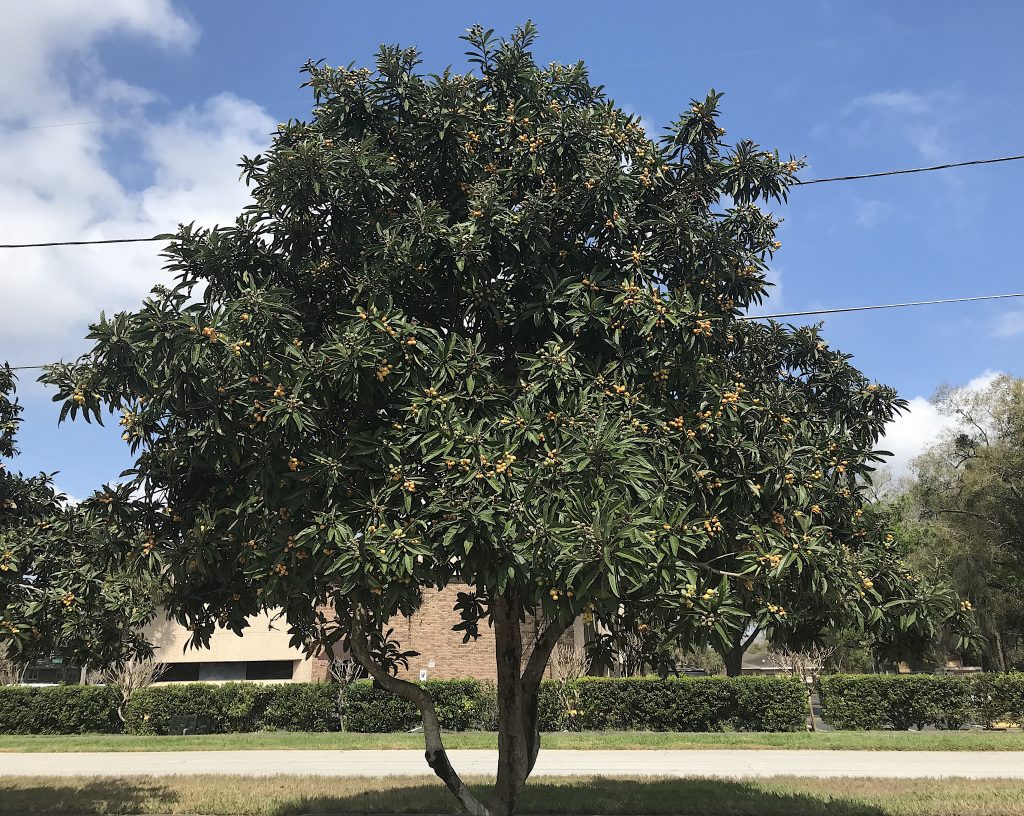
Loquats are coming into season. Photo by Green Deane
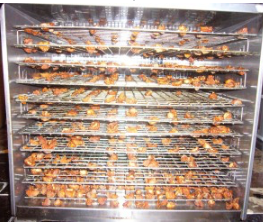
Dehydrating loquats. They preserve well. Photo by Green Deane
I’ve been scrounging loquats this past week though the proper verb is “scrumping” (liberating fruit from others by picking it.) They are just beginning to ripen, so there is an occasional sour one. Evidence we are not a hungry country… yet.) Over the next few weeks they will sweeten and litter the ground. Loquats are among the fruits that are still quite tasty after dehydration (mulberries are not.) Just as a plum becomes a prune, Loquat turn into something different but still quite edible. We should hold a contest for the most suitable name for a dried loquat… a Lune? Anyway, I cut them around the equator, take the seeds, then set them in the dehydrator. They take a day or two to dry. I store them in paper bags, some time in the refrigerator, sometimes not. A bounty of fruit is about to ripen, get your share and prepare for the future. Speaking of said…
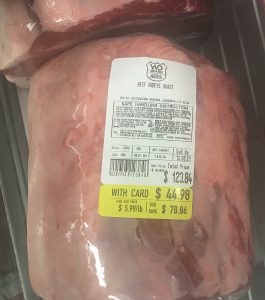
$124 rib roast.
The summer before COVID a local supermarket had a Buy-One-Get-One-Free sale every week on large roasts of beef or pork. I stuffed my freezer with them. When COVID broke the BOGOs disappeared and have not returned. Indeed, if anything they have raised the price on roasts. See photo left, which is a 7.5 pound ribeye roast for only $123.84 (unless you join their shopping program, then it is $45.) My parents fed three humans, half a dozen cats, a multitude of dogs, five horses, chickens, ducks, rabbits and an occasional pet squirrel for less than $123 a month. Needless to say there are no roasts still in my freezer. It seems there was plenty of beef two years ago but not enough workers to process or transport it from point A to Z. Just like COVID the virus of war in eastern Europe could disrupt food supplies. Energy prices will surely go up and that effects the delivery and cost of everything. My grandparents went through the first flu epidemic, two world wars and the great depression in between. My mother was a teenager during the depression thus… The house I grew up in and where my mother lived for more than 60 years always had a stash of food and water. We didn’t have wars or hurricanes in Maine but often we were snowed in for several days following a nor’easter. Everybody laid in extra wood and food and expected to be housebound. If you had a heart attack when the roads were closed — like our neighbor did — or gave birth you were on your own. Nothing moved, which was the same way in Florida was after Hurricane Frances. I’ve been through five hurricanes that made destructive landfall. What I learned from Franny was you can never have enough drinking water on hand (back home there was plenty of snow to melt.) Of course the question is what if the regional war on the other side of the world goes global? Closet supplies don’t last forever.
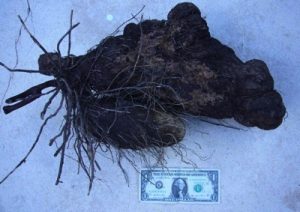
The root of the winged yam. Photo by Green Deane
By far the biggest caloric payoff regarding plants locally is the Winged Yam, Dioscorea alata (the little-known relative of the invasive Air Potato.) It is our largest provider of calories in for calories out (which means finding it and digging it up.) After boiling like a potato it is used like a potato. It’s flavorful and nutritious with a silkier texture than a potato which can be granular. Think of it as a free bag of potatoes. They are easy to find from May to December. The vine dies back as the days grow short. It comes back up sometime in April. It’s relative, the one we don’t eat, tends to comes up first in March depending on the weather. Then the edible one in April. You can find the edible yams this time of year if you know where they grow. You locate their dried, broken off vines hanging from low tree branches. That can give you a hint as to there they are below the vine. The top of the root is near the surface and is kind of like a tent stake at ground level fully driven in. If you clear the ground with your hands (wear gloves) you can find them even when out of season. I have an article on finding caloric staples and one on wild flours. If you’re interested in eating bugs…
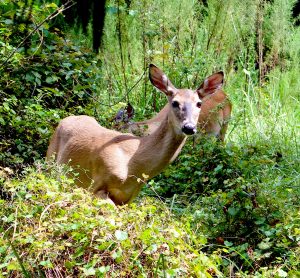
You can eat roadkill deer even out of season. Photo by Green Deane
As you might presume I don’t have a hard time finding food. That said what I also cart home regularly is road kill, mostly possoms, squirrels, raccoons, armadillo and an occasional duck. Consider it recycling. I’ve passed up a couple of alligators ’cause they would not easily fit in my small Miata and because you need to have a permit to have alligator in your possession, even road kill. That is not the case with deer. (See state reply at bottom.) If the deer is road kill — meaning it definitely died by accident not intentional hunting — you can take it home but the expectation is that you will first contact authorities. That way you have verified the road kill and won’t get in further trouble if a nosey good samaritan reports you. What I can tell you about road kill is your nose with tell you if it is good or not. (As I am usually traveling in the early morning most of the run overs are quite fresh.) Squirrels clean better if soaked in water first, possums smell bad when cleaning but taste good cooked (I wear a swimmer’s nose plug while cleaning them.) Wear gloves and a mask while cleaning an armadillo — any one got a mask? — then parboil it before cooking with the meat. Be scrupulously clean when working with armadillos. Called Hoover Hogs they were a mainstay during the Depression. There has been one report of one person getting one case of leprosy from a live armadillo in Florida. Be clean. And you can get poison ivy from duck feathers or other wild animals. Only humans, some monkeys and guinea pigs get poison ivy. As I got poison ivy from a duck I do wear disposable gloves now when cleaning road kill. And when inspecting road kill watch out for traffic. A woman died last November 6th at 2:30 a.m. in east Orlando when she stopped her car in the road to check on a deer that had been hit. Neither lived.
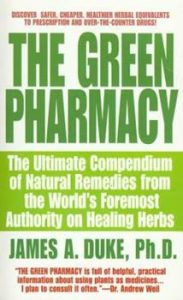 And what of prescriptions? I am not a doctor nor an herbalist but willow tips can stand in for aspirin, Biden alba leaves make an anti-inflammatory tea, Sida is good for congestion, wilted sweet clover can reduce clotting. Two generic books that address plants and their application to common illnesses are Medicinal Plants by Foster and Duke, and the Green Pharmacy by James Duke. Not local but handy to have in your library or backpack. A local herbalist would have the most relevant information for your plants and problems. James Duke was a botanist for the Department of Agriculture and an advocate of “natural” medicine. He died in December 2017, age 88.
And what of prescriptions? I am not a doctor nor an herbalist but willow tips can stand in for aspirin, Biden alba leaves make an anti-inflammatory tea, Sida is good for congestion, wilted sweet clover can reduce clotting. Two generic books that address plants and their application to common illnesses are Medicinal Plants by Foster and Duke, and the Green Pharmacy by James Duke. Not local but handy to have in your library or backpack. A local herbalist would have the most relevant information for your plants and problems. James Duke was a botanist for the Department of Agriculture and an advocate of “natural” medicine. He died in December 2017, age 88.
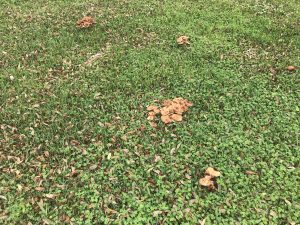
Ringless Honey Mushrooms in late February.
Ringless Honey Mushrooms are well-known for flushing in the fall. Locally that is usually the first or second week in November, in the Carolinas that’s the end of August and early September. Then in some years, depending upon the weather, they will have a minor flush in April. It looks like they are early this year with this photo taken at the end of February. They are growing on the roots of trees blown down by Hurricane Frances in 2004. I also saw some two weeks ago in central Florida and West Palm Beach. It’s a controversial mushroom with some experts considering it choice, others not edible. Ringless Honey can cause some folks digestive upset. I have an article here and a video.
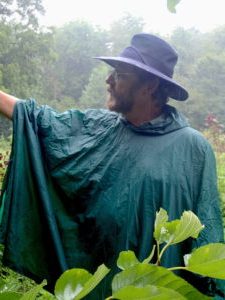
Classes are held rain or shine or cold. (Hurricanes are an exception.) Photo by Kelly Fagan.
Foraging Classes: Doing a make up class at John Chestnut this Saturday and then back to Mead Gardens this Sunday.
Saturday March 5th, John Chestnut County Park: 2200 East Lake Road, Palm Harbor, FL 34685. Meet at the trail head of the Peggy Park Nature Walk, pavilion 1 parking lot. 9 a.m. to noon.
Sunday March 6th, Mead Garden: 1500 S. Denning Dr., Winter Park, FL 32789. Meet at the bathrooms. 9 a.m. to noon.
Saturday March 12th, Bayshore Live Oak Park, Bayshore Drive. Port Charlotte. 9 a.m. to noon. Meet at the parking lot at Ganyard and Bayshore
Sunday March 13th, Blanchard Park, 10501 Jay Blanchard Trail, Orlando, FL., 9 a.m. to noon. Meet next to the tennis courts.
Saturday March 19th, Boulware Springs Park, 3420 SE 15th St., Gainesville, FL, 9 a.m. to noon. Meet at the pavilion.
Sunday March 20th, Colby-Alderman Park: 1099 Massachusetts Street, Cassadaga. Fla. 9 a.m. to noon. Meet at the bathrooms.
Saturday March 26th, George LeStrange Preserve, 4911 Ralls Road, Fort Pierce, FL, 34981. 9 a.m. to noon. This location does not have official bathrooms or drinking water.
Sunday March 27th, Mead Garden: 1500 S. Denning Dr., Winter Park, FL 32789. Meet at the bathrooms. 9 a.m. to noon.
Saturday/Sunday May 7th & 8th, Honea Path, South Carolina, classes at 9 a.m. and 1 p.m. each day.
For more information, to pre-pay or sign up go here
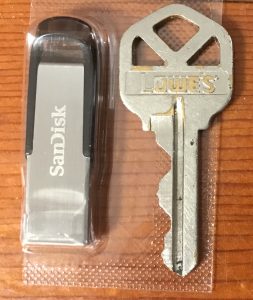
You get the USB, not the key.
My nine-DVD set of 135 videos has been phased out and replaced by 171-videos on a 128-GB USB, see left. The USB videos are the same videos I have on You Tube. Some people like to have their own copy especially if social order falters. The USB videos have to be copied to your computer to play. If you want to order the USB go to the DVD/USB order button on the top right of this page or click here. That will take you to an order form. Or you can make a $99 donation, which tells me it is for the USB (include a snail-mail address.) I’d like to thank all of you who ordered the DVD set over the years which required me to burn over 5,000 DVDs individually. I had to stop making them as few programs now will read the ISO files to copy them. Burning a set also took about three hours.
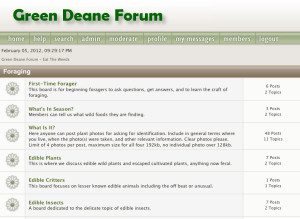
Green Deane Forum
Want to identify a plant? Perhaps you’re looking for a foraging reference? You might have a UFO, an Unidentified Flowering Object, you want identified. On the Green Deane Forum we — including Green Deane and others from around the world — chat about foraging all year. And it’s not just about warm-weather plants or just North American flora. Many nations share common weeds so there’s a lot to talk about, such as the one to the left. There’s also more than weeds. The reference section has information for foraging around the world. There are also articles on food preservation, and forgotten skills from making bows to fermenting food. Recent topics include: California Wild Mushroom Parties, A Good Reason To Eat Wild Garlic, Black Walnuts and Amaranth, Sea Salt and Plastic, Wild Mustard? Heavy Metals. Oriental Persimmons. What is it? Pine Cough Drops and Needles, Skullcap, Malodorous Plant? Another NJ Tree, Maypop? Roadside Plant, Unknown in Sudan, Please Help Identify, and Preserving Prickly Pear Bounty. You can join the forum by clicking on the button on the upper right hand side of this page.
This is my weekly newsletter #497. If you want to subscribe to this free newsletter you can find the sign-up form in the menu at the top of the page. My website, EatTheWeeds.com, which is data secure, has over 1500 plants on it in some 428 articles. I wrote every one myself, no cut and paste.
To donate to the Green Deane Newsletter click here.
02/27/2007
Thank you for contacting the Florida Fish and Wildlife Conservation Commission (FWC). When it comes to a road kill deer, there is no specific statue or administrative code to address it. FWC has historically allowed the driver of the vehicle that strikes the deer to keep the carcass regardless of season or possession of a hunting license. Usually such incidents are documented by either the FWC, a county sheriff, or the Florida Highway Patrol who provide an accident report for the vehicle’s insurance company.
Your question sounds like you are referring to a deer that has been struck and killed, but not by the vehicle YOU are driving. If you happen along a road kill carcass and would like to take the deer for the meat, that would also be legal. Provided that there is absolutely no question that the deer was indeed the victim of an automobile strike. The best course of action would be to contact the FWC wildlife hotline and explain the situation so that an incident could be created to document the case. This would ensure that if you were stopped by a law enforcement officer or reported by a member of the public for “possession of deer out of season” that you would be able to prove that you indeed had a road kill carcass.
The number you would need to call would be 1-800-404-FWCC (3922).

